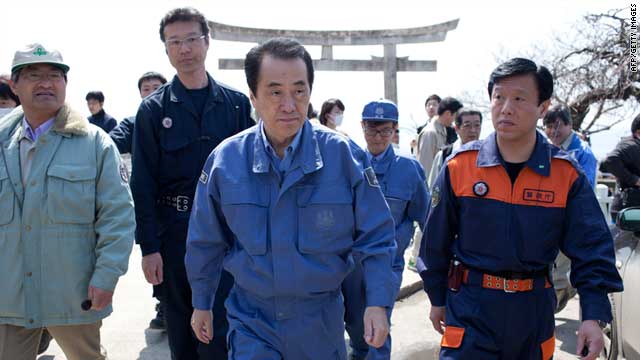Japan's Prime Minister to give up salary

- Naoto Kan says he will give up his premier salary but not his lawmaker's salary
- Kan's salary is 1,636,000 yen a month ($20,200 a month)
- About 100 residents returned to their homes in the evacuation zone for a short visit Tuesday
- Residents are allowed to go into the area for two hours
Tokyo (CNN) -- Japan's Prime Minister Naoto Kan said Tuesday that he will give up his salary until the nuclear crisis in the country is over.
He also said he would review the country's energy policy and consider other energy sources like wind and solar power.
Kan said he would give up his prime minister salary which is 1,636,000 yen a month ($20,200 a month), but he would still receive his lawmaker's salary.
The prime minister's announcement comes the same day that about 100 residents, who had been evacuated from an area close to Japan's Fukushima Daiichi nuclear plant, were allowed to return home Tuesday for a short visit to gather belongings. After donning protective suits to guard against radiation,the residents where allowed to go to their homes in the village of Kawauchi, officials said.
 Workers enter reactor No. 1 in Japan
Workers enter reactor No. 1 in Japan
 Fukushima: An unfolding disaster
Fukushima: An unfolding disaster
 Fukushima's impact
Fukushima's impact
They were only allowed one small bag and could stay in their homes for two hours. For some, this was the first time they had been home since April 22 when the Japanese government issued the mandatory evacuation from a 20-kilometer area around the nuclear plant.
"I left my medicine even though I have a chronic illness. I need to get it," a man told Japanese public broadcaster NHK.
Also left behind were pets.
Residents may be able to go back and get their pets in the near future, officials said. After two hours at their homes, residents were taken to a base to undergo examinations for radioactive substances. Cooling systems at Fukushima Daiichi, about 240 kilometers (150 miles) north of Tokyo, were knocked out by the devastating tsunami that struck Japan's Pacific coast after a massive earthquake March 11.
The disaster triggered the worst nuclear accident since Chernobyl as the cores of reactors 1-3 overheated and spewed huge amounts of radioactive contamination across the surrounding area.
The disaster has led to mandatory evacuations of about 78,000 people living within 20 kilometers (12.5 miles) of the plant. People living another 10 kilometers away -- or at least another 60,000 people -- have been ordered to remain sheltered.
CNN's Junko Ogura and Yoko Wakatsuki contributed to this report.
